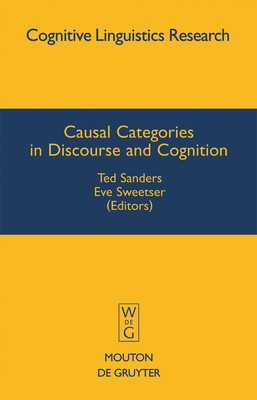
- We will send in 10–14 business days.
- Publisher: Walter de Gruyter
- Year: 2009
- Pages: 259
- ISBN-10: 3110224410
- ISBN-13: 9783110224412
- Format: 15.6 x 23.4 x 1.6 cm, hardcover
- Language: English
- SAVE -10% with code: EXTRA
Causal Categories in Discourse and Cognition (e-book) (used book) | bookbook.eu
Reviews
Description
All languages of the world provide their speakers with linguistic means to express causal relations in discourse. Causal connectives and causative auxiliaries are among the salient markers of causal construals. Cognitive scientists and linguists are interested in how much of this causal modeling is specific to a given culture and language, and how much is characteristic of general human cognition. Speakers of English, for example, can choose between because and since or between therefore and so. How different are these from the choices made by Dutch speakers, who speak a closely related language, but (unlike English speakers) have a dedicated marker for non-volitional causality (daardoor)?
The central question in this volume is: What parameters of categorization shape the use of causal connectives and auxiliary verbs across languages? The book discusses how differences between even quite closely related languages (English, Dutch, Polish) can help us to elaborate the typology of levels and categories of causation represented in language. In addition, the volume demonstrates convergence of linguistic, corpus-linguistic and psycholinguistic methodologies in determining cognitive categories of causality. The basic notion of causality appears to be an ideal linguistic phenomenon to provide an overview of methods and, perhaps more importantly, invoke a discussion on the most adequate methodological approaches to study fundamental issues in language and cognition.
EXTRA 10 % discount with code: EXTRA
The promotion ends in 8d.19:29:42
The discount code is valid when purchasing from 10 €. Discounts do not stack.
- Publisher: Walter de Gruyter
- Year: 2009
- Pages: 259
- ISBN-10: 3110224410
- ISBN-13: 9783110224412
- Format: 15.6 x 23.4 x 1.6 cm, hardcover
- Language: English English
All languages of the world provide their speakers with linguistic means to express causal relations in discourse. Causal connectives and causative auxiliaries are among the salient markers of causal construals. Cognitive scientists and linguists are interested in how much of this causal modeling is specific to a given culture and language, and how much is characteristic of general human cognition. Speakers of English, for example, can choose between because and since or between therefore and so. How different are these from the choices made by Dutch speakers, who speak a closely related language, but (unlike English speakers) have a dedicated marker for non-volitional causality (daardoor)?
The central question in this volume is: What parameters of categorization shape the use of causal connectives and auxiliary verbs across languages? The book discusses how differences between even quite closely related languages (English, Dutch, Polish) can help us to elaborate the typology of levels and categories of causation represented in language. In addition, the volume demonstrates convergence of linguistic, corpus-linguistic and psycholinguistic methodologies in determining cognitive categories of causality. The basic notion of causality appears to be an ideal linguistic phenomenon to provide an overview of methods and, perhaps more importantly, invoke a discussion on the most adequate methodological approaches to study fundamental issues in language and cognition.


Reviews